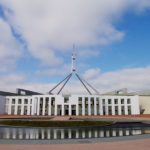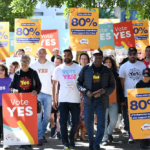Don’t Tread on My Privacy
One troubling implication for privacy with technological and policy development today is the unyielding belief that if somebody considers that something enhances our lives, it should be done.
We are living in a world where our ability to remain private is rapidly diminishing. A recent article highlights that through data analytics, corporations will be able to track our activities, habits and locations with unprecedented precision.
This brings to mind the fascinating thought experiment recently posed by Scott Adams, the creator of Dilbert – Noprivacyville. Adams imagines a city without privacy, where everyone’s movements and activities are tracked and known. The concept of a “transparent society” is not new – David Brin wrote about this more than a decade ago, with a similar sense of “optimism” about such a society.
The underlying premise of the growing field of data analytics, and of life in Noprivacyville, is that our lives are better off when privacy is removed. In the article, a Yahoo executive remarked that “if someone can deliver a compelling, relevant experience for me as a consumer, then I don’t mind it so much”. Adams cites numerous benefits in cost, safety and convenience if our lives (outside of the bedroom and bathroom) are completely open.
For better or worse, many aspects of Noprivacyville exist or are in the process of being developed in the real world. Unsurprisingly, they are being pushed by those with vested interests, all in the name of enhancing our lives for the better.
Law enforcement wants better surveillance and more investigatory powers, to keep us safe. The government wants to collect and consolidate medical records, to improve health services. Advertisers want to track internet usage to deliver relevant, targeted ads. Online companies push location-sharing technology, to enhance our social lives. And this is just the tip of the iceberg.
Often they will insist that we won’t care, that what really matters are the goodies handed out to us. The assumption is that privacy is an annoying barrier and things would necessarily be better without it. This is patently false.
Consider what things could really be like if we put each of these propositions together until everyone knows what everyone else is doing. Will people be more wary of what they do, what they say and where they go? Will there be the same level of entrepreneurialism, innovation and creative spirit? A complete lack of privacy could well have a chilling effect on humanity. It also carries the implication that there is no internal moral compass but only the external compass that comes from being observed.
Furthermore – and this is the fundamental point – perhaps we just don’t want to give up our privacy. What we do, where we go, who we associate with – it is our business to decide who knows, no-one else’s unless we are breaking the law or creating some other demonstrable risk to society.
As I have said in the past, privacy is about control – choosing to open up on one’s own terms.
Sure, give us centralised medical records, but let us choose to opt in rather than collating information without our knowledge or consent. Give us better targeted ads, but let us choose not to be tracked if we don’t want them. Give us the ability to share our location, photos and messages, but let us choose how we do it and don’t automatically assume that we want maximum visibility.
At least in Noprivacyville, people have the option of leaving the city if they don’t like what they are experiencing. In the real world, we don’t have that luxury.
Yes, there are real benefits – as well as potential consequences – in giving up our privacy. But there are also benefits in keeping it. Since it is our privacy, the balancing test should be done by us, taking into account our personal predilections.
Corporations and to an extent, governments, should not be able to impose what they think is the right balance. Mark Zuckerberg certainly doesn’t speak for me when he talks about how he thinks individuals want to share information about themselves.
To be fair, the Australian Government is making personalised health records an opt-in option and the Australian Direct Marketing Association has issued a guideline for online behavioural advertising. However, the proof of the pudding will be in how their respective policies are enforced.
It is incumbent on all of us to protect our right to privacy and to hold accountable those who wish to assume away our privacy for whatever benefit they deem worthy to bestow upon us.
Malcolm Crompton is Managing Director of Information Integrity Solutions (IIS), a globally connected company that works with public sector and private sector organisations to help them build customer trust through respect for the customer and their personal information. He was also foundation President of the International Association of Privacy Professionals, Australia New Zealand, www.iappANZ.org.
Malcolm Crompton is the Founder and Lead Privacy Advisor of IIS Partners (IIS), a company that works with public and private sector organisations to build trust with customers through protecting their personal information.














WencyQ
April 28, 2011 at 7:36 am
How are you going to describe
How are you going to describe the kind of politics that we have right now in the society?What’s your stand on this issue and how are you going to make it right?Even in the health care reform that we have.Even before being signed into law, the health care reform bill has been heavily debated. Now the High court has issued a ruling that will force each case against the law to be heard through all lower courts first. The essential effect of this ruling is that healthcare reform could be in some form of limbo for years. I read this here: Supreme court refuses to issue early ruling on health care law
Malcolm Crompton
April 28, 2011 at 10:45 pm
All good questions…
All good questions…
That said, the court case to which you refer is in the jurisdiction of the United States and I am not sure that there is similar ruling here in Australia.
So, yes we also need to address imbalances at the political level too.
Again, here in Australia, the former federal Minister for Finance Lindsay Tanner has just published a book criticising the trivialisation of politics in recent decades and the role that the media have played in forcing politics into that direction. Many nations are suffering from that disease, not just Australia. So I guess it is up to us to change how we vote, how we participate and what TV, radio, newspaper and online forums we watch and in which we participate!
And yes, participation in processes can have impact. The way the National eHealth Transition Authority has sought input from health consumers, clinicians and others shows that. You may want to see more of it, but the impact of participation so far is there for all to see.